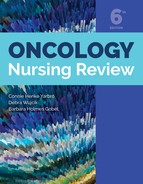41. It is not uncommon for the spouse of a patient with cancer to be unwilling to discuss his or her concerns with the patient because of fears that it might be distressing to the patient. This type of communication is referred to as:
- Privileged communication
- Filtered communication
- Balanced communication
- Protective buffering communication
42. Levels of social support have been associated with individual coping capabilities. The most beneficial finding of studies on social support for patients with cancer is:
- Attendance and use of support groups
- Cognitive-emotional therapy and relaxation therapy
- Opportunity to discuss thoughts and feelings with an attentive, empathetic, professional listener
- Supportive-expressive group therapy
43. There are barriers that can limit family members’ ability to obtain information and support from nurses and other health professionals. The most common barrier is:
- Lack of clarity about who is responsible for helping family members
- Lack of value placed on the support of the family in the care of the patient
- Lack of effective professional–family communication
- Lack of time and the constraints that exist in the healthcare system
44. When providing support for Ms. Wiggins, a 47-year-old African American, who was just diagnosed with breast cancer, which of the following considerations is most important?
- The woman of the family is generally charged with the responsibility for protecting the health of family members.
- The family assumes the responsibility for making treatment decisions on the patient’s behalf.
- Patients may not give consent for treatment until permission is obtained from the mother or grandmother.
- The nuclear family is very important, and men assume dominant roles and decision-making.
45. Problems that patients with cancer experience, such as anxiety and depression, can be reduced through:
- Counseling
- Referral to a mental health professional
- Participation in support groups
- Pharmacologic management
46. Patient education along the cancer continuum should be individualized based on:
- The type of information available by the healthcare provider
- The patient’s IQ level of understanding
- The patient’s learning style
- The patient’s socioeconomic and reading level
47. Research has shown that African American breast cancer survivors valued support groups that considered:
- Their specific type of cancer they were living with
- Involvement of their family unit
- Providing counselors in addition to the support group
- Their cultural, socioeconomic positions, with emphasis on spirituality and religion
